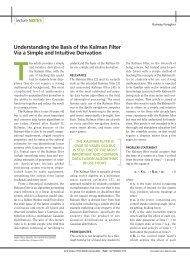December 11-16 2016 Osaka Japan
W16-46
W16-46
Create successful ePaper yourself
Turn your PDF publications into a flip-book with our unique Google optimized e-Paper software.
2.1 Quantization and Binarization of Language Models<br />
Heafield et al. (2013) compared KenLM’s trie data structure against other n-gram language model toolkit.<br />
He empirically showed that it uses less memory than the smallest model produced by other tools that<br />
creates lossless models and it was faster than SRILM (Stolcke, 2002) that also uses a trie data structure.<br />
The floating point non-positive log probabilities of the n-gram and its backoff penalty can be stored in<br />
the trie exactly using 31 and 32 bits 5 respectively. These floating point values can be quantized using q<br />
bits per probability and r bit per backoff to save memory at the expense of decreased accuracy. KenLM<br />
uses the binning method to sort floats, divides them into equal size bins and averages the value within<br />
each bin. As such floats under the same bin shares the same value.<br />
While quantization is lossy, we can use point compression (Whittaker and Raj, 2001) to remove the<br />
leading bits of the pointers and implicitly store the table of offsets into the array. Although point compression<br />
reduces the memory size of the language model, retrieving the offsets takes additional time.<br />
The trie is produced by using the KenLM’s build binary tool. The quantization and trie binarization<br />
is performed using the last command below:<br />
LM_ARPA=‘pwd‘/${TRAINING_DIR}/lm/lm.${LANG_E}.arpa.gz<br />
LM_FILE=‘pwd‘/${TRAINING_DIR}/lm/lm.${LANG_E}.kenlm<br />
${MOSES_BIN_DIR}/lmplz --order ${LM_ORDER} -S 80% -T /tmp \<br />
< ${CORPUS_LM}.${LANG_E} | gzip > ${LM_ARPA}<br />
${MOSES_BIN_DIR}/build_binary trie -a 22 -b 8 -q 8 ${LM_ARPA} ${LM_FILE}<br />
The -a option sets the maximum number of leading bits that the point compression removes. The -q<br />
and -b options sets the number of bits to store the n-gram log probability and backoff respectively 6 . We<br />
can stack the point compression with quantization as shown above, the -a 22 -b 8 -q 8 will set<br />
the maximum leading bits removal to 22 and stores the floating points for log probabilities and backoff<br />
penalties using 8 bits.<br />
2.2 MGIZA++ and Clustercat<br />
Gao and Vogel (2008) implemented two parallelized versions of the original GIZA++ tool, PGIZA++<br />
that uses multiple aligning processes where when the processes are finished, the master process collects<br />
the normalized counts and updates the model and child processes are restarted in the next iteration and<br />
MGIZA++ that uses multi-threading on shared memory with locking mechanism to synchronize memory<br />
access.<br />
Given a computing cluster (i.e. multiple machines), using PGIZA++ would be appropriate whereas<br />
MGIZA++ is suited for a single machine with multiple cores. An up-to-date fork of MGIZA++ is maintained<br />
by the Moses community at https://github.com/moses-smt/mgiza.<br />
While one might face issues with creating the MGIZA++ binaries from<br />
source compilation 7 , the Moses community provides pre-built binaries 8 on<br />
http://www.statmt.org/moses/?n=moses.releases. These can be easily downloaded<br />
and saved to a directory (e.g. /path/to/moses-training-tools) on the terminal as<br />
such:<br />
wget -r -nH -nd -np -R index.html* \<br />
http://www.statmt.org/moses/RELEASE-3.0/binaries/linux-64bit/training-tools/ \<br />
-P /path/to/moses-training-tools<br />
And the EXT BIN DIR variable in the training script can be set and be used in the translation model<br />
training process as such:<br />
5 Backoff penalty may sometimes be positive<br />
6 Note that unigram probabilities are never quantized<br />
7 Following the instructions on http://www.statmt.org/moses/?n=Moses.ExternalTools#ntoc3<br />
8 E.g. the direct link for the Linux OS can be found on http://www.statmt.org/moses/RELEASE-3.0/binaries/linux-<br />
64bit/training-tools/<br />
187



